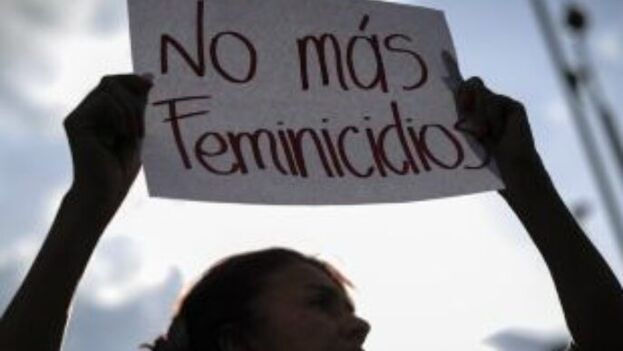
![]() 14ymedio, Madrid, 10 May 2023 — The Supreme People’s Court confirmed on Tuesday the life imprisonment of two Cubans sentenced in 2022 for sexist murders against their wife and ex-partner respectively. The two convicts, Yadier Delvá Simón and Alexander Nápoles Téllez, had appealed their sentences, but the high court rejected both appeals.
14ymedio, Madrid, 10 May 2023 — The Supreme People’s Court confirmed on Tuesday the life imprisonment of two Cubans sentenced in 2022 for sexist murders against their wife and ex-partner respectively. The two convicts, Yadier Delvá Simón and Alexander Nápoles Téllez, had appealed their sentences, but the high court rejected both appeals.
“Both individuals were sanctioned to perpetual deprivation of liberty, as perpetrators of two crimes of murder, by depriving the lives, using bladed weapons and blunt instruments, of the one who had been his wife and mother of his only son, in the case of the first accused and, the second, previously a couple, once she decided to separate from him,” explains the press release by official media.
The high court “held that these events irremediably mark the future of the minor children of the victims and arouse total revulsion and absolute rejection by society, which defends inclusion, equality and non-violence,” the text adds.
The trials were held in the past days — without specifying — in Havana and Ciego de Ávila. Delvá Simón asked to be exonerated alleging a “deep state of psychological alteration,” but the court considers that the witness, documentary and expert evidence disprove this and demonstrate his responsibility. In his case, the penalty is joined by the withdrawal of guardianship over the son he had in common with the victim.
Nápoles Téllez, for his part, claimed repentance, but the judges attribute falsehood to him and argue that the crime was amply proven.
The Supreme Court adds in its note that article 345 of the new Criminal Code, in force since December 1, provides for the crime of murder “sanctions of 20 to 30 years, perpetual deprivation of liberty or death” for those who “kill a woman as a result of gender violence,” which “evidences the will of the Cuban State to guarantee protection and legal attention to them, severely punishing those who are declared responsible for these events.”
The addition comes shortly after President Miguel Díaz-Canel said that there will be “zero tolerance” for sexist violence, which he described as an “unacceptable act.” The statements took place in April as part of a meeting called Voices of Women for Gender Non-Violence, held in Santa Clara.
“A single woman violated is not only a blow to the feminist tradition of the Revolution, it is an unacceptable act for our socialist society,” Díaz-Canel stressed in a year in which at least 27 women have already been murdered, counted thanks to the Alas Tensas and Yo Sí Te Creo platforms, with the help of local networks, since the ruling party does not have an official and public record of these (and other) crimes.
The known figure of femincides is three times that of last year, when as of May there were nine murders, although it cannot be ruled out that the ability to make an accurate account is improving as the associations are consolidated. In 2022, these platforms were able to verify 36 femicides.
Their role has been decisive in now targeting an evil scourge that blatantly affects the Island, which, with independent data alone, is double the number of sexist murders in Spain, whose population is almost five times that of Cuba. In this country, one of the worst in the official record of femicides, 14 women murdered by their partners or ex-partners have died so far this year.
The most recent official Cuban statistics on domestic violence appeared in the 2016 National Gender Equality Survey, in which 10,698 women participated.
Of these, 26.7% of women between the ages of 15 and 74 said they had suffered some type of violence in their relationship in the 12 months prior to the study. Of these, only 3.7% of those assaulted asked for institutional help.
Cuban feminist platforms continue to demand a Comprehensive Law against Gender Violence, which at the moment is not contemplated on the Island, where a reflection on the matter has been announced for 2026. This type of rule goes beyond the criminalization of the crime of murder and tries to put the emphasis on prevention through education and awareness, as well as in the training of judges, doctors, police and other workers involved in this type of violence, previously considered as a domestic issue.
Translated by Regina Anavy
____________
COLLABORATE WITH OUR WORK: The 14ymedio team is committed to practicing serious journalism that reflects Cuba’s reality in all its depth. Thank you for joining us on this long journey. We invite you to continue supporting us by becoming a member of 14ymedio now. Together we can continue transforming journalism in Cuba.
